- Home
- Robin LaFevers
Dark Triumph (His Fair Assassin #2) Page 11
Dark Triumph (His Fair Assassin #2) Read online
Page 11
I rush back to the others. “Hurry! We need to get to the cart before we are seen. New sentries could arrive any moment.”
The jailor looks up at me with his sad little face and shakes his head. He does not think his prisoner can take another step. I glare at him, wishing he would speak so he could be the one to cajole this knight forward. I had not thought it possible to hate myself more than I already did, but the vile things I have called this tortured knight have proven me wrong. “Wake up, you. How dare you sleep while your duchess is in danger?” His eyelids flicker, but that is all. True worry sets in and I must use the most cruel weapon in my arsenal. “They are closing in on her, those men. D’Albret’s men. Do you know what they say about d’Albret? How he treats his women?”
The jailor motions to me—to my face. There is a softness in his gaze that I do not understand. He motions again and I put my hand up to my cheek. It is wet. I glare at him as I scrub the dampness away. “If you cannot be bothered to bestir yourself on her behalf, he will maul her with his rough, hairy hands, violate her flesh—”
With a roar that startles a bray from one of the waiting donkeys, the knight pushes himself from the wall and lurches forward. The little jailor tries to steer his lumbering charge to the cart, but the knight resists, instead lunging toward me. Startled, I look up and our eyes meet. His are a pale, silver blue, I realize, just before his fist connects with my jaw and everything goes black.
Chapter Fifteen
I SLOWLY BECOME AWARE THAT I am dreaming, for I feel as safe and snug as a babe in a cradle. Or perhaps a babe in a boat, bobbing in the sea.
A very bumpy sea, I amend, as a jarring thud rattles my entire body. I try to open my eyes, but it is as if they’ve been sewn shut. When I finally wrench them open, all I can see is a dark sky filled with fading stars.
Where in the names of the Nine Saints am I?
I try to think, shuffling back through my memories like a banker though stacks of coin. The knight. I was getting him to the cart and then . . . what? Filled with a trickle of foreboding, I struggle to sit up. The movement has my stomach roiling like a nest of eels. Just in time, I lean over the side and retch miserably.
When I have finished with that, the throbbing in my head lessens enough that I can begin to make sense of my surroundings. A strong smell of manure fills my nose, making me think of retching again, and I see a jaunty yellow flag flapping in the night breeze.
Frantic, I glance around. The knight lies still and lifeless beside me as we jolt and bump along the road. There are no houses, no shops, no city walls anywhere. There is nothing but gently rolling countryside and farmsteads as far as my eye can see.
I am in the be-damned cart! The knight . . . he hit me. Knocked me out cold with his great ham-shaped fist and, for some reason, he—and the jailor—have brought me with them.
No. No! I look around once again to try to get my bearings. How long have I been out? Moments? Hours? More important, how far away are we from Nantes? Perhaps it is not too late to go back.
But no matter how hard I squint and peer, I cannot see the walls of the city. Which means all my plans—and my hard-won resolve—have turned to ash. The giant ogre beside me has given Fortune’s wheel such a hard turn that it has spun out of my grasp entirely.
The prisoner next to me does not so much as stir at the vile oath that flies from my mouth, but the jailor, who is driving, looks over his shoulder and tips his cap. That cheerful gesture infuriates me further and I scramble to my feet, ignoring the wave of nausea that follows. As we hit a bump in the road, I nearly tumble out. Grabbing the back of the bench, I clamber gracelessly into the front next to the jailor, then wait for the dizziness to pass before I begin railing at him. “What have you done?” I finally manage to get out. “I was not supposed to come with you! You have ruined everything!”
The little gnome shrugs and points his thumb at the unconscious knight.
I glance at the hulking form laid out in the wagon bed. How dare he? What addlepated thought crossed his fevered brain and caused him to bring me with them? I want to leap into the back of the cart and pound my frustration out on his thick, misbegotten hide. Instead, I curl my hands into fists, press my nails into my palms, and hope the pain of it will clear my head. To have been denied my desire to wreak vengeance upon d’Albret for so long, only to have it snatched away when it is finally in my grasp, is nearly unbearable. It is all I can do not to put my head back and roar out my fury at God and all His saints.
Then suddenly, like a kettle boiled dry, my anger is gone and I am left feeling as empty and hollow as a drum. My one chance, the one I have waited months—no, years!—for, has been irrevocably lost. Never again will I be in such a position to exact vengeance on d’Albret.
Never again. The words rattle around in my head like two stones in a bucket.
But that also means I cannot go back—cannot be sent back—for even the cold-hearted abbess will recognize how impossible it would be for me to earn d’Albret’s trust again.
Which means . . . I have escaped.
I try to think. In all my seventeen years, have I ever known anything—anyone—to escape d’Albret? Not his wives, nor his children, nor his enemies. Only the duchess, and she did so twice, once in Guérande and the second time almost a fortnight ago.
While it makes sense that the gods would bestir themselves for the duchess, I cannot believe they would bestir themselves for me. They never have before.
Escape. The word is as ripe and seductive as summer’s first fruit, so much so that I must shy away from it and remind myself that hope is but the god’s way of mocking us, nothing more.
I give myself a moment, then another, to compose myself, then turn to the jailor beside me. I pretend I have not stormed and railed and fumed for the last mile and ask calmly, “How is our charge?”
Relief crosses his wrinkled little face, and he gives an enthusiastic nod of his head. I glance over my shoulder, uncertain the knight’s condition warrants such enthusiasm, but say nothing. With all my other options scuttled, it seems my best course of action is to get the knight to Rennes. Alive, if possible.
And with that thought comes a reminder. None of it will matter a whit if d’Albret finds us, for even now he is likely gathering forces for pursuit. Luckily, all of his soldiers will be groggy and ill for a few more hours yet, and I do not think he will ride out himself.
Somewhere in the distance, a rooster crows. Soon, sleepy farmers will stumble out of their cottages and begin tilling their fields. And see us. We cannot risk that. “We must find shelter,” I tell the jailor.
He nods sagely, as if he has already thought of this.
“There will be pursuit,” I warn him. “So our shelter needs to be well hidden from the road.” What has taken us all night to travel could be covered in a matter of hours by one of my father’s men on a swift strong horse.
The jailor nods again, points to a copse of trees in the distance, then steers the cart in that direction.
I study his crooked, lined face. Can I trust him? For the hundredth time I wonder at the strange relationship between the knight and his jailor. Does the Beast of Waroch command courage and loyalty even from those who guard him? For surely my father assigned only the most loyal of his men to tend to his valuable prisoner, and yet the jailor not only did not try to prevent our escape but joined us.
Hopefully, he has not risked so much and come so far only to betray us now.
Just as true dawn breaks, we come in sight of an old stone lodge. It is far from the main road—indeed, from any road at all, I realize as the cart bumps over a rock—and well secluded in a patch of woods. The gargoyle pulls the cart to a halt and waits just inside the trees. It is a small manor house built of gray stone and, by all appearances, deserted. There is no activity in the courtyard, no scratching chickens or bleating goats, and no smoke rises from the chimney. It is almost too much to hope for, that this hidden place is empty and waiting for us. Still not completely sur
e of the jailor’s motives, I jerk my head toward the house. “Go see if anyone is inside.”
His quick nod of compliance assures me somewhat that this is no trap. Still, someone must scout the place out to be certain it is clear. Until the old man has proven himself to be fully trustworthy, he may as well be the one to do it.
As he looks around, I steer the cart to the back of the lodge and fret once more over my situation. Should I attempt to return to Nantes and finish my self-appointed task? Once I am committed to a purpose, it is no easy thing for me to walk away.
I could claim Beast abducted me.
Except they know how weak and wounded he was, and my involvement is the only explanation for the drugged guards. I fear my hand in this is plain to see.
Perhaps, a small voice inside me whispers, Mortain has simply answered your prayers. Can it not be as simple as that? But of course, nothing—nothing—has ever been simple.
Our shelter is one of the late duke’s lesser lodges, the sort he would retreat to with a handful of his most trusted men or one of his least favorite mistresses. It is perfect for our purposes: sturdy and hidden from the casual passerby. Most important, I have never heard d’Albret or any of his men speak of it, which gives me some hope that they do not know it exists.
Just as the jailor comes scampering out, indicating that no one is home, the thick clouds overhead release their burden and it begins to rain. However, even wounded and ill and passed out, the knight is still a giant of a man. “We cannot carry him in,” I tell the jailor.
He reaches out and shakes the knight, but not even his eyelids flicker in response. Concerned that he has died on the way here, I look to his chest, relieved when I see it rise and fall with his breathing. The jailor begins to shake him harder, but I stop him. I glance up at the rain falling from the sky, big fat drops that plop down onto my face. Cleaning the prisoner up will be a mighty chore involving buckets and buckets of water. “We will let the rain do some of the hard work for us. It is not a freezing rain—let it wash some of the prison grime from him before we take him inside.”
The jailor scowls, as if this is some great insult or injury I have offered his master, but I ignore him, grab two of the bundles tucked up against the side of the cart, and head for the lodge. He can follow or not, it makes no difference to me.
While the jailor stays to cluck over the knight, I make a quick exploration of the lodge to see with my own eyes that no one is here. The back door opens directly into a large kitchen with a fireplace. There is a hall beyond, and three chambers on the second floor. They are all empty of any but the most basic furnishings, and nothing but cold ashes sit in the hearths.
Since getting the knight up the stairs is out of the question, we will have to set up a trestle table in the kitchen. I go to the door and see the jailor dripping by the side of the cart, as if his getting soaked will somehow lessen his prisoner’s discomfort. I motion him over.
When he is close enough, I hand him a rough cloth to dry himself. “I need to set up a table in here, but I cannot move it myself.”
Together with many grunts and muttered oaths we get the trestle in the kitchen and cover it with two old blankets we found. The effort has chased any remaining chill from my bones. “Let’s go see if we can get him in here,” I say with a sigh of resignation, for it will be as easy as trying to maneuver a greased ox.
Outside, the rain has not only cleansed some of the filth from the patient but roused him from his sleep. As the jailor and I peer down at him over the sides of the cart, he blinks up at us, the water spiking his thick lashes. When he sees me, his eyes cloud with confusion, and suddenly my anger rises up in me again, a white-hot fury that he has robbed me of my prize—the one thing that would have justified all I have endured the past six months. I lean down and get my face close to his. “I have been sent on the duchess’s own orders to aid you, and how do you repay me? By ruining all my carefully laid plans.”
His eyes widen in surprise. “From now on, until I get you safely to Rennes, you will do exactly as I say and no more, do you understand? Else I will leave you here to rot in the rain.”
“What did I ruin?” His voice is rough, like a shower of rocks tumbling downhill.
“Plans that I worked six long months to put in place. Why? Why did you do it?” I ask.
“Do what?”
I reach up and touch my tender jaw. “Take me with you.”
He shakes his head, as if trying to clear it. “The last thing I remember is an insistent, soul-searing voice spewing venom and lies.”
“That was me,” I say curtly.
“You?” He looks thoroughly nonplussed, as if he cannot reconcile that voice with what he sees before him.
“Yes, you great lummox. It was the only way I could get you moving up the stairs and into the cart.”
“You tried to bring the battle lust upon me? Have you feathers for brains?”
“No one had a better idea on how to get you out of that dungeon. I simply used the tools at hand.”
“You’re lucky you only got a clout to the jaw.” He squints up at me again, as if trying to make sense of something in his mind. “Besides, you looked afraid,” he mutters.
I gape at him. “Now who has feathers for brains? I had a mission—there was no fear involved.” But that is a lie. I was terrified, and I hate that he saw it.
Chapter Sixteen
PALE AS A CORPSE AND breathing heavily, the knight eases onto the trestle table, then the jailor helps him lie down. He closes his eyes, and it is clear that even this small amount of activity has cost him much. Merde. It is just as well I am not returning to Nantes because this man will need every ounce of my paltry healing skills—and a bit of the gods’ own luck—in order to make it to Rennes. If he dies on the road, then I will have well and truly nothing for all my work and sacrifice. I snag a bucket from a hook on the wall and thrust it at the jailor. “Here. We’ll need water to finish washing him. And fetch the two bundles left in the cart.”
Without questioning me, he takes the bucket and heads back outside into the rain. I take a tinderbox from one of the bundles I brought in and move to the fireplace to start a fire. The clouds overhead will likely mask any smoke that manages to clear the treetops. Even so, I build only a small fire, just enough to heat some water for the poultices I must make up for the knight’s wounds.
When the jailor returns, he sets the two bundles next to the others, then busies himself pouring water from the bucket into a battered old tin pot. I thrust a wad of cloth in his hand. “Finish washing him so that I may tend his injuries. Cut away his garments if you have to.” Again the jailor does what I ask, and I begin to relax somewhat.
For the next little bit, we work in companionable silence, the jailor washing the prisoner, the prisoner gathering the strength to ask all the questions I can feel swirling in his head, and myself mixing the powdered elm bark and mustard with the boiling water and praying the damage to his body is not too far beyond my skill.
When my preparations are done, I slowly rise. It is time to see just how dire his situation is.
The man’s feet jut over the edge of the table, and his face, still ashen beneath the black and green bruises, is as cheerfully ugly as any I have ever seen. His cheeks are pockmarked, and a long scar puckers one side of his face. His nose has been broken—more than one—and he has a notch in one ear. None of which will improve once the swelling and bruising go down.
His body is as thick as a boar’s, with bulging ropes of muscle and sinew. If a sculptor wanted to bring brute strength to life, he would carve a body such as this. Nearly all of it is covered in some sort of scars, the red, angry recent ones mingling with the silvery white of the older.
In spite of myself, I am fascinated—perhaps even impressed—by the damage this one man has sustained.
And survived.
I step closer, and, of its own volition, my hand reaches out to him, my fingers skimming oh so lightly across his battered, ravaged fle
sh. “How is it you are still alive?” I wonder.
“I am nearly impossible to kill.” The deep rumble of his voice fills the room to the rafters. My gaze snaps up to his face; I had not realized I’d spoken aloud. His eyes, though filled with pain, are fiercely intelligent and put me in mind of a wolf’s, with their eerie light coloring.
“Ah,” I say, “that is good to know. Now I need not worry quite so much while I tend to your wounds.”
His eyebrows shoot up. “You?” Those fierce blue eyes rake up and down my entire body, not with prurient interest but in detached assessment.
I make a great show of looking around the empty kitchen. “You have someone else in mind? Your jailor, perhaps? Surely if he were able, he would have tended to them already.”
I thrust my hand out at the jailor, who has been watching our exchange with nervous eyes, and wiggle my fingers. After a moment’s uncertainty, he hands me the cloth, and, in spite of my threat of roughness, I begin gently cleaning the patient’s face, removing yet another layer of grime. It does not help his appearance any, but I am relieved to see there are no serious cuts or breaks under the dirt.
I turn my attention to the long gash that runs along the meat of his forearm. It does not go to the bone, nor were any tendons or ligaments severed, but it will need a deep cleaning, which will not be pleasant for either of us. The two puncture wounds from the arrows in his left shoulder are infected and inflamed. Covering my fingers with the cloth, I press gently against them, searching for any remaining shards of wood or iron. The patient sucks in his breath sharply, but that is all.
“No splinters, then, so those will be easily enough dealt with. And the arrows appear to have missed any vital ligaments.”

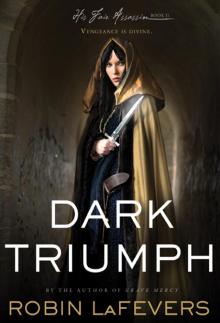 Dark Triumph
Dark Triumph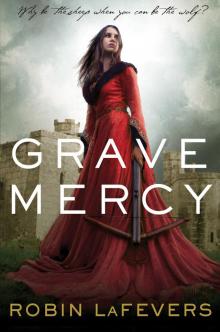 Grave Mercy
Grave Mercy Courting Darkness
Courting Darkness Igniting Darkness
Igniting Darkness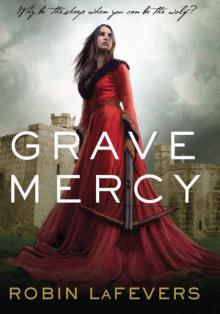 Grave Mercy (Book I) (His Fair Assassin Trilogy)
Grave Mercy (Book I) (His Fair Assassin Trilogy)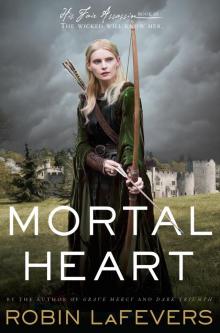 Mortal Heart
Mortal Heart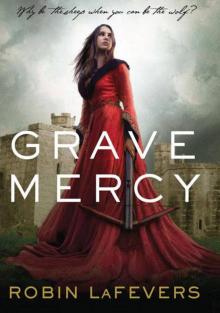 Grave Mercy (Book I): His Fair Assassin, Book I (His Fair Assassin Trilogy)
Grave Mercy (Book I): His Fair Assassin, Book I (His Fair Assassin Trilogy)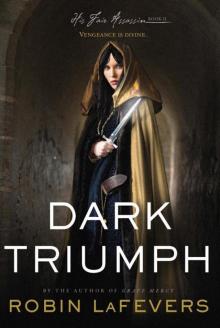 Dark Triumph (His Fair Assassin #2)
Dark Triumph (His Fair Assassin #2)